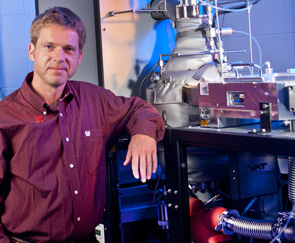
Mathias Schubert, associate professor of electrical engineering, has been elected a fellow of the American Physical Society. Election to the fellowship is limited to no more than one-half of 1 percent of the society’s membership.
The APS has 14 divisions and nine topical groups covering all areas of physics research. There are six forums that reflect the interests of its 43,000 members in broader issues, and eight sections organized by geographical region.
Schubert was cited by the APS council at its November meeting for the “development of generalized ellipsometry and the invention of the Optical Hall Effect, and their transformative potential for industrial characterization of materials properties.” Those materials could be developed into such things as liquid crystal displays or semiconductor device structures.
Schubert joined UNL in 2005 after studying physics at Universitat Leipzig in Germany. He obtained a fellowship at UNL in 1993 which he maintained through 2002, and has had fellowships in Germany, Sweden and France. As part of the Complex Materials Optics Network in the department of electrical engineering and the Nebraska Center for Materials and Nanoscience, his research focuses on applied optics, optical materials preparation, characterization and instrumentation development.
Schubert and colleague Tino Hoffman, a research assistant professor at UNL, demonstrated the optical-Hall effect at the International Conference on Spectroscopic Ellipsometry in Stockholm in 2007. Together with chemistry professor and dean of graduate studies Patrick Dussault, Schubert is also co-directing the new Center for Nanohybrid Functional Materials at UNL where both are seeking better ways to find and quantify minute things, such as toxins in the air or cancer particles in blood.
— Kelly Bartling, University Communications